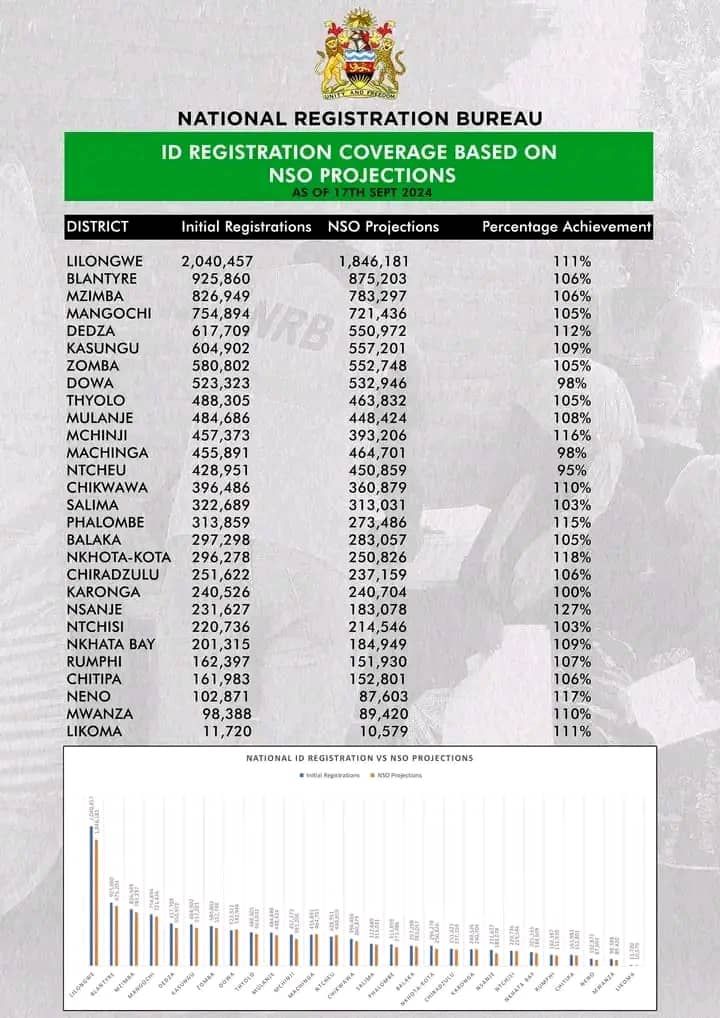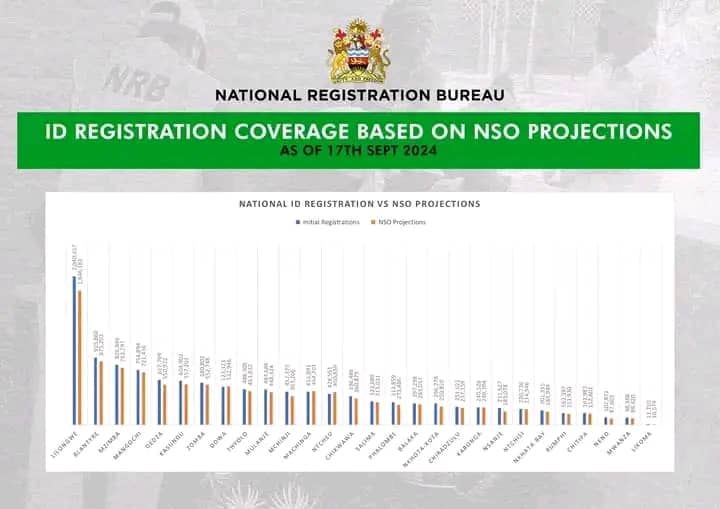By Burnett Munthali
As Malawi approaches the 2025 general elections, the national identification (ID) registration process has taken center stage in the country’s political landscape. National ID cards serve as essential documents for voter registration, financial services, and access to government programs, making their distribution a critical issue. By 17th September 2024, the coverage of national ID registration is being closely scrutinized, with political analysts focusing on how well the National Registration Bureau (NRB) has met the projections provided by the National Statistical Office (NSO).
The NSO’s population projections have long been used as a benchmark for national registration coverage. According to the NSO, the estimated population of Malawi stands at approximately 21 million people, of which about 15 million are adults eligible for national ID registration. By September 2024, the NRB aimed to cover at least 90% of eligible citizens, meaning around 13.5 million people should have been registered.

However, discrepancies between NSO projections and actual registration numbers have emerged, especially in certain districts. With a significant focus on political battlegrounds like Lilongwe district, political stakeholders are keen to see whether the national ID registration process meets expectations.
By the 17th of September 2024, the NRB reported that approximately 11.8 million citizens had been successfully registered with national IDs, representing roughly 78% of the eligible population. While this number reflects significant progress, it falls short of the 90% target set for this period.
A deeper analysis reveals regional disparities in registration coverage. Urban centers such as Blantyre, Zomba, and Mzuzu have achieved coverage rates of over 85%, but the process has been slower in rural and peri-urban areas, particularly in districts like Chitipa, Nsanje, and Lilongwe.
Lilongwe, being the political capital and home to a substantial portion of Malawi’s electorate, has emerged as a focal point in the national ID registration drive. The district, which has an estimated eligible population of 1.3 million adults according to NSO projections, has become a strategic area for political parties ahead of the 2025 elections.
By mid-September 2024, Lilongwe had registered approximately 920,000 people, representing just over 70% of the eligible population. This shortfall is of particular concern to political actors, as Lilongwe is expected to be a decisive district in the next elections. Delays in registration, logistical challenges, and administrative inefficiencies have been cited as reasons for the slower pace in Lilongwe.
The lower registration figures in Lilongwe have sparked intense political debate. Opposition parties, particularly the Democratic Progressive Party (DPP) and United Democratic Front (UDF), have accused the government of deliberately slowing the registration process in areas where they enjoy strong support. The ruling Malawi Congress Party (MCP), however, has dismissed these claims, citing technical issues and challenges with resource allocation as the primary causes for the delays.
Several challenges have contributed to the disparity between NSO projections and actual ID registration coverage:
Firstly, many rural areas, including parts of Lilongwe, have faced delays due to inadequate staffing and equipment, with some centers lacking the necessary machines to process ID applications efficiently.
Secondly, a lack of adequate public awareness campaigns, particularly in remote districts, has led to lower turnout rates for registration. Citizens in rural areas are less likely to access information about registration deadlines and requirements.
Thirdly, allegations of political interference have emerged, with opposition parties claiming that certain areas are being marginalized in the registration process to influence voter turnout in the upcoming elections. These accusations have further fueled political tensions.
Fourthly, while the NRB’s efforts to register millions of citizens have been commendable, the bureau has faced funding shortages that have affected its ability to deploy adequate resources to all regions of the country.
Implications for the 2025 elections
As the country gears up for the 2025 general elections, the national ID registration process is more than just a bureaucratic exercise—it is a matter of political significance. With registration coverage falling short of NSO projections in key districts like Lilongwe, concerns are growing over voter disenfranchisement.
Political parties, civil society organizations, and electoral watchdogs are urging the government to address the gaps in registration coverage to ensure that all eligible citizens have the opportunity to participate in the democratic process. If the current challenges persist, there is a risk that thousands of Malawians—particularly in politically significant districts—could be excluded from voting, which could spark post-election disputes.
Conclusion
By 17th September 2024, the national ID registration process has made progress but remains behind NSO projections. The shortfall in registration coverage in critical areas like Lilongwe district is a major point of concern, especially with the upcoming elections. Addressing the challenges facing the registration process will be essential to ensuring that all eligible Malawians can participate in the 2025 elections. The political eyes on Lilongwe district reflect the high stakes of this issue, and how the situation unfolds will play a significant role in shaping the country’s electoral landscape.



